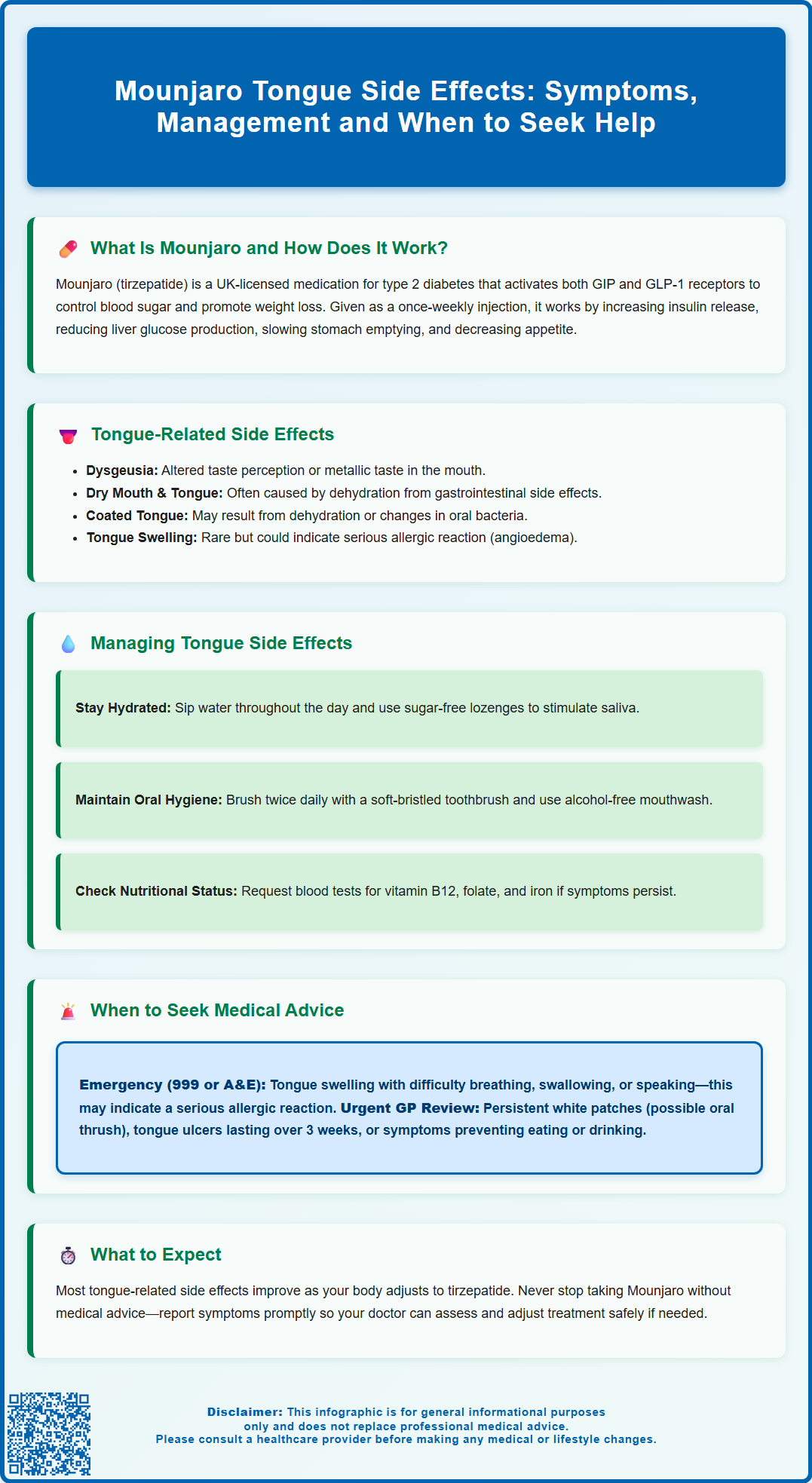Mounjaro (tirzepatide) is a dual GIP and GLP-1 receptor agonist licensed in the UK for type 2 diabetes management. Whilst gastrointestinal symptoms are the most common adverse effects, some patients report tongue-related concerns whilst taking this medication. These may include dry mouth affecting the tongue, taste disturbances (dysgeusia), or rarely, tongue swelling. Understanding which tongue symptoms are expected, which require medical attention, and how to manage them can help patients use tirzepatide safely and effectively. This article examines the evidence for tongue side effects associated with Mounjaro and provides practical guidance for patients and healthcare professionals.
Summary: Tongue-specific side effects are not prominently listed in Mounjaro's official prescribing information, except for dysgeusia (taste disturbance), though some patients report dry mouth, coated tongue, or rarely, tongue swelling.
- Tirzepatide is a dual GIP and GLP-1 receptor agonist administered as a once-weekly subcutaneous injection for type 2 diabetes.
- Dysgeusia (taste disturbance) is a recognised adverse reaction documented in the Summary of Product Characteristics.
- Dry mouth and coated tongue may result from dehydration secondary to gastrointestinal side effects rather than direct medication effects.
- Tongue swelling with difficulty breathing or swallowing may indicate angioedema and requires immediate emergency medical attention.
- Good oral hygiene, adequate hydration, and sugar-free lozenges may help manage mild tongue-related symptoms.
- Persistent tongue ulceration lasting more than 3 weeks warrants urgent two-week wait referral in line with NICE guideline NG12.
Table of Contents
What Is Mounjaro and How Does It Work?
Mounjaro (tirzepatide) is a prescription medicine licensed in the UK for the treatment of type 2 diabetes mellitus as an adjunct to diet and exercise. Tirzepatide is also available under the brand name Zepbound for weight management in adults with obesity or overweight with weight-related comorbidities. It belongs to a novel class of medications known as dual glucose-dependent insulinotropic polypeptide (GIP) and glucagon-like peptide-1 (GLP-1) receptor agonists. This dual mechanism distinguishes tirzepatide from other GLP-1 receptor agonists currently available.
The medication works by mimicking the action of two naturally occurring incretin hormones in the body. GLP-1 stimulates insulin secretion when blood glucose levels are elevated, suppresses glucagon release (which reduces glucose production by the liver), slows gastric emptying, and promotes satiety through central appetite regulation. GIP complements these effects by enhancing insulin secretion and is thought to potentially influence fat metabolism, though this mechanism is still being fully elucidated in clinical research.
Mounjaro is administered as a once-weekly subcutaneous injection, typically in the abdomen, thigh, or upper arm. The dose is gradually increased over several weeks to minimise gastrointestinal side effects and improve tolerability. As with all GLP-1 receptor agonists, tirzepatide is associated with a range of potential adverse effects, most commonly affecting the gastrointestinal system. The Summary of Product Characteristics (SmPC) lists specific adverse reactions including dysgeusia (taste disturbance) and hypersensitivity reactions, while patients may also report other symptoms affecting the oral cavity and tongue.
Tongue-Related Side Effects of Mounjaro
Whilst gastrointestinal symptoms such as nausea, vomiting, and diarrhoea are the most frequently reported adverse effects of tirzepatide, some patients have noted changes or discomfort affecting the tongue. It is important to clarify that tongue-specific side effects are not prominently listed in the official Summary of Product Characteristics (SmPC) for tirzepatide, with the exception of dysgeusia (taste disturbance), which is a recognised adverse reaction.
Some patients report a dry sensation in the mouth that may affect the tongue. This could be related to dehydration from gastrointestinal side effects or reduced fluid intake rather than a direct effect of the medication. Reduced fluid intake may lead to a dry, uncomfortable sensation on the tongue, altered taste perception, or a feeling of the tongue sticking to the roof of the mouth. Some patients describe a coated or furry tongue, which may result from dehydration, changes in oral flora, or reduced oral intake.
Taste disturbances (dysgeusia) are documented in the tirzepatide SmPC and can manifest as a metallic taste, altered flavour perception, or general taste changes that patients may associate with tongue discomfort.
In rare instances, patients may experience tongue swelling, soreness, or inflammation. Tongue swelling could indicate an allergic reaction or angioedema, which is listed as a potential hypersensitivity reaction in the SmPC. Other conditions such as oral candidiasis (thrush) may develop as a complication of diabetes or antibiotic use rather than as a direct medication effect. Nutritional deficiencies resulting from reduced food intake could theoretically contribute to glossitis (tongue inflammation), particularly in patients also taking metformin, which can reduce vitamin B12 absorption.

When to Seek Medical Advice About Tongue Symptoms
Most tongue-related symptoms experienced whilst taking tirzepatide are mild and self-limiting, but certain presentations require prompt medical evaluation. Patients should be advised to call 999 or go to A&E immediately if they experience tongue swelling, particularly if accompanied by difficulty breathing, swallowing, or speaking. These symptoms may indicate angioedema or an allergic reaction, which constitutes a medical emergency. Patients should withhold further doses of tirzepatide if hypersensitivity is suspected, pending medical review.
Persistent or severe tongue pain, ulceration, or white patches that do not resolve within a few days should prompt medical review. White patches may suggest oral thrush (candidiasis), which can occur in patients with diabetes, particularly if glycaemic control is suboptimal. Any unexplained oral or tongue ulceration persisting for more than 3 weeks warrants urgent referral via the two-week wait pathway for suspected cancer, in line with NICE guideline NG12.
Patients should also consult their healthcare provider if tongue discomfort significantly affects their ability to eat, drink, or take medications, as this could impact both nutritional status and diabetes management. Persistent taste disturbances that affect quality of life or lead to reduced oral intake should be discussed with a clinician, as adjustments to treatment or additional supportive measures may be beneficial. It is important that patients do not discontinue their medication without medical guidance, as abrupt cessation may affect glycaemic control. Instead, any concerning symptoms should be reported promptly to allow appropriate assessment and management decisions to be made in consultation with the prescribing clinician.
Managing Tongue Side Effects While Taking Mounjaro
For patients experiencing mild tongue-related symptoms whilst taking tirzepatide, several practical strategies may help alleviate discomfort and improve tolerability. Maintaining good oral hygiene is fundamental—patients should brush their teeth at least twice daily with a soft-bristled toothbrush and use an alcohol-free mouthwash to avoid further drying of the oral mucosa. Regular dental check-ups are advisable, particularly for patients with diabetes, who are at increased risk of periodontal disease and oral infections.
Adequate hydration is essential to combat dry mouth and associated tongue discomfort. Patients should be encouraged to sip water regularly throughout the day and may find sugar-free lozenges, chewing gum, or saliva substitutes helpful in stimulating saliva production. Avoiding caffeine, alcohol, and tobacco can also reduce oral dryness. If taste disturbances are problematic, experimenting with different food temperatures and textures, maintaining good oral hygiene before meals, and using plastic rather than metal cutlery may help minimise metallic tastes.
For patients with suspected oral thrush, antifungal treatment may be prescribed following clinical assessment. Options include nystatin oral suspension or miconazole oral gel, though it's important to note that miconazole oral gel can interact significantly with certain medications, particularly warfarin. Patients should seek advice from their prescriber or pharmacist before using miconazole products. Optimising glycaemic control is also important in preventing recurrent fungal infections. If tongue symptoms are thought to be related to nutritional deficiencies, a healthcare professional may recommend blood tests to assess vitamin B12, folate, and iron levels, with appropriate supplementation if deficiencies are identified. This is particularly relevant for patients taking metformin, which can reduce vitamin B12 absorption.
Patients should be reassured that many side effects, including tongue-related symptoms, often improve over time as the body adjusts to the medication. If symptoms persist or significantly impact quality of life despite supportive measures, the prescribing clinician may consider dose adjustment or, in rare cases, switching to an alternative treatment. Patients are encouraged to report any suspected side effects to the MHRA Yellow Card Scheme, which helps monitor the safety of medicines in the UK.
Frequently Asked Questions
Are tongue side effects common with Mounjaro?
Tongue-specific side effects are not prominently listed in the official prescribing information for Mounjaro, except for dysgeusia (taste disturbance). Some patients report dry mouth or coated tongue, which may be related to dehydration from gastrointestinal side effects rather than a direct effect of tirzepatide.
When should I seek emergency help for tongue symptoms whilst taking Mounjaro?
Call 999 or go to A&E immediately if you experience tongue swelling, particularly if accompanied by difficulty breathing, swallowing, or speaking, as this may indicate angioedema or an allergic reaction requiring urgent medical treatment.
How can I manage dry mouth and tongue discomfort whilst taking tirzepatide?
Maintain good oral hygiene with twice-daily brushing, sip water regularly throughout the day, use sugar-free lozenges or chewing gum to stimulate saliva production, and avoid caffeine, alcohol, and tobacco which can worsen oral dryness.
The health-related content published on this site is based on credible scientific sources and is periodically reviewed to ensure accuracy and relevance. Although we aim to reflect the most current medical knowledge, the material is meant for general education and awareness only.
The information on this site is not a substitute for professional medical advice. For any health concerns, please speak with a qualified medical professional. By using this information, you acknowledge responsibility for any decisions made and understand we are not liable for any consequences that may result.
Heading 1
Heading 2
Heading 3
Heading 4
Heading 5
Heading 6
Lorem ipsum dolor sit amet, consectetur adipiscing elit, sed do eiusmod tempor incididunt ut labore et dolore magna aliqua. Ut enim ad minim veniam, quis nostrud exercitation ullamco laboris nisi ut aliquip ex ea commodo consequat. Duis aute irure dolor in reprehenderit in voluptate velit esse cillum dolore eu fugiat nulla pariatur.
Block quote
Ordered list
- Item 1
- Item 2
- Item 3
Unordered list
- Item A
- Item B
- Item C
Bold text
Emphasis
Superscript
Subscript










